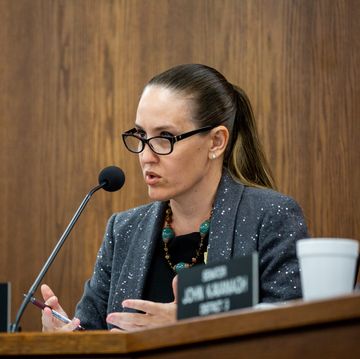Update: A few hours after midnight, the Senate 's proposed "skinny repeal" failed to win the 50 votes it needed to pass the chamber. Every Democrat and three Republican senators voted against it; they were John McCain (R-AZ), Susan Collins (R-ME), and Lisa Murkowski (R-AK).
Ah, the Republicans. The Grand Old Party; the conservators of family values; the guardians of all the old-fashioned moral values that once made this country great. This week, America has gotten a nice, long look at at least one of those apparent Republican creeds. For example, the one that maintains it's a-OK to threaten your female colleagues for disagreeing with you.
In the past week, not one, but two white, male Republican politicians have threatened women in their own party with words that imply physical violence. The Republicans who have voted against the latest ACA repeal efforts have been disproportionately female. Senators Shelley Moore Capito (R-WV), Susan Collins (R-ME), and Lisa Murkowski (R-AK) all voted against a repeal-only bill; on Tuesday, Collins and Murkowski were the only Republicans to vote against opening Trumpcare to "debate."
The hint of a gender rift in the Republican Party is heartening. The response from the dudes of the GOP is anything but.
"Listen, the fact that the Senate does not have the courage to do some of the things that every Republican in the Senate promised to do is just absolutely repugnant to me," Rep. Blake Farenthold (R-TX) insisted on talk radio show "Keys 1440 AM." "Some of the people that are opposed to this — there are some female senators from the Northeast — if it was a guy from South Texas, I might ask him to step outside and settle this Aaron Burr-style." By "Aaron Burr-style," of course, Farenthold is presumably referencing Aaron Burr's gun duel with Alexander Hamilton, in which Burr shot Hamilton dead.
Not to be outdone, Rep. Buddy Carter (R-GA) chimed in with a threat whose grossness was matched only by its folksiness: "I'm tellin' ya, somebody needs to go over to that Senate and snatch a knot in their ass," he told MSNBC. Several thousand discreet Google searches later, it was discovered that "snatch a knot" means hitting somebody — specifically, as per Urban Dictionary, it means hitting them as a form of "punishment or retribution" — and the world was appropriately appalled.
As it happens, Carter was speaking to defend yet one more Republican man's aggression toward the female Senators in question — not Farenthold, but President Trump himself, who had attacked Murkowski by name on Twitter, saying that she "really let the Republicans, and our country, down."
The tweet did not include any direct violent threat. But it didn't have to; the female subjects of his tweetstorms report that vicious harassment, including death and rape threats, ensues from being targeted on his feed. One 18-year-old who asked Trump an unflattering question at a debate told The Washington Post that "her phone began ringing with callers leaving threatening messages that were often sexual in nature. Her Facebook and email inboxes filled with similar messages… [and] her addresses circulated on social media."
According to the Post, one Facebook message read: "Wishing I could f---ing punch you in the face. id then proceed to stomp your head on the curb and urinate in your bloodied mouth and i know where you live, so watch your f---ing back punk."
So! Lisa Murkowski is probably not going to have a pleasant weekend. And maybe you don't want her to. Over the past several weeks, some progressives have pushed back against the suggestion that any of these three Republican women senators are martyrs or feminist heroes. Despite their recent healthcare votes, they're still conservatives — with fundamentally conservative politics. Murkowski, for example, has a fairly moderate record on women's issues, one of the few Republicans who's vocally opposed to defunding Planned Parenthood. But at the same time, she's stridently anti-gun control, having voted against an assault weapons ban and extended background checks, just for starter, and a frequent opponent of the ACA. In fact in 2016, she insisted on her campaign website that "the Affordable Care Act, also known as Obamacare, impact[s] us deeply and negatively" and that "the Affordable Care Act has proven to be unaffordable."
Yet these women don't have to be likeminded for the violence aimed at them to matter. Sexism affects all women — sympathetic and unsympathetic alike. And like we do with Megyn Kelly or any of the deeply frustrating conservative women thrust into the spotlight by the Trump administration (Sarah Huckabee Sanders — come on down!), we can condemn the sexism they receive without co-signing everything they've ever done.
In fact, the spectacle of grown-ass elected officials threatening their female colleagues matters for several reasons. The targeting of Collins, Capito, and Murkowski is symptomatic of the enduring sexism that keeps too many women out of politics — and of the rot that's overtaken the Republican party in the age of Trump.
We've learned the hard way that women in politics are disproportionately targeted for rhetorical violence. One worldwide report published by the Inter-Parliamentary Union found that more than 40 percent of female parliamentarians said they had received threats of death, rape, or other physical violence; a full 20 percent had actually been pushed, slapped, or hit. And more than half of the women surveyed — 65 percent — said they had been subjected to "humiliating sexist remarks." These comments were not coming from constituents. "In the vast majority of cases," the IPU summary explains, "such remarks were made in parliament by male colleagues – from opposing parties as well as their own."
Let's repeat that: "as well as their own." Female politicians on both sides of the aisle not only have to anticipate hostility from their political opponents, they can expect to be undermined and humiliated by the men who are supposedly on their team. Collins, Capito, and Murkowski are only the latest example in a long-standing pattern.
Of course, the sexism of American politics is not a recent development. The United States is notably worse at electing women than other countries; the IPU currently ranks the U.S. 101 out of 193 countries in terms of female representation. That puts us not only 100 slots below Rwanda — where women have led in government ever since genocide decimated the country's male population — but 38 places behind Canada, 51 places behind Australia, and 61 behind the United Kingdom.
Under Trump, the quiet sexism of exclusion has given way to the loud, belligerent sexism of threats, slurs, and intimidation. Research shows that Trump's rise has spurred an uptick in male aggression. The President's misogyny has emboldened misogynists everywhere, and his preferred tactics — insulting, threatening, and browbeating anyone who stands in his way — are becoming increasingly popular. If Farenthold and Carter feel comfortable publicly threatening their party's women into compliance, well, that's not a great shock, given that the candidate who once urged "Second Amendment people" to "do something" about his female political opponent now leads them.
The assumptions beneath Farenthold and Carter's threats — that women do not have the right to form their own ideological or political priorities; that they must fall in line with men's priorities and goals, or else; that verbal or even potential physical violence is something men have the right to exercise on women who defy them — say a whole lot about how Farenthold and Carter view women, to be sure. But they're even more damning because they demonstrate how Farenthold, Carter, and the Republican Party, more widely, view politics.
The Republican Party is a shambles at least in part because it is committed to presenting a unified front at all costs — which now means supporting Trump and Trump's policies, no matter how dangerous, ignorant, or unpopular they may be. We're all familiar with the spectacle of Paul Ryan refusing to defend Trump after one hideous misstep or another or John McCain, that "maverick," delivering a stern speech about whatever is the matter with Trump's latest move only to rally behind both Trump and his stumbles shortly thereafter. This is a party where "success" is defined as everybody beating the same drum, no matter what.
Women don't get to be "mavericks." They just get threatened and shamed for breaking rank. Yet there is absolutely no good reason for Murkowski, Collins, or anyone else to fall in line with Trumpcare. It's massively unpopular; in June, only 16 percent of Americans agreed that it was "a good idea." The fact that the Republicans keep resurrecting it has more to do with the ongoing drive to punish Barack Obama than with any legislative mandate. At the end of the day, no matter what their politics may be, nobody wants to lose their health insurance. That's why it doesn't matter if Collins, Murkowski, or Capito are progressive; they don't have to be. All they have to be is competent politicians, committing to the the bare minimum by refusing to vote for a bill their constituents despise.
And for that crime, their supposed ideological allies treat them like heretics; they're burned at the stake by their own colleagues. It's shameful. And it's a reminder that misogyny has consequences for more than just the women at whom it chooses to explicitly take aim. Republicans are so dead set on maintaining "unity" and so committed to drowning out women's voices — a problem that has plagued Trumpcare since its inception when exactly zero women were included in the working group that wrote it — that they're about to vote themselves right off a cliff.
Rather than recognize the danger their obedience to the party line has created, they're yelling at Lisa Murkowski for not obeying orders. Still, she may yet get the last laugh. Come 2018, constituents will remember which politicians honored their frequent calls and loud demonstrations and which were busy making fools of themselves on MSNBC. Unlike Carter and Farenthold, they may not even care that the senators who did their jobs were girls.













